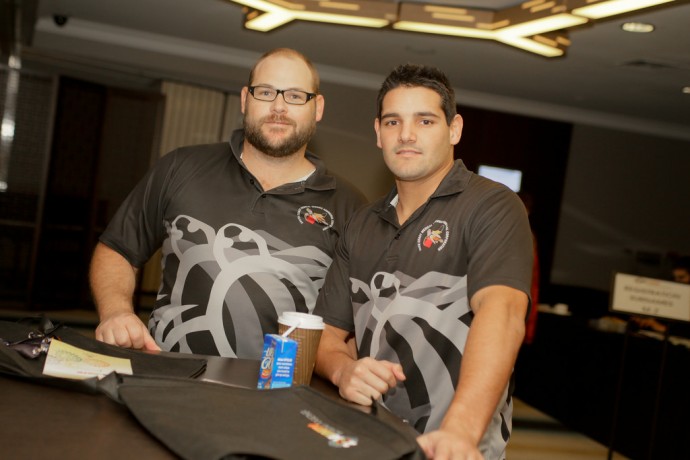Nathan Deaves and Wade Longbottom work in the Workforce Support Unit at the South Coast Aboriginal Medical Service. Last year they began working on two video training resources for aspiring drug and alcohol workers.

Last year Wade and Nathan began working on two video training resources for aspiring drug and alcohol workers.
As a result, the videos have now closed a gap in the industry in terms of culturally appropriate education and training for Aboriginal drug and alcohol workers.
“The video is a visual learning resource for new Aboriginal drug and alcohol workers. The films aim to provide advice and touch on some important factors and important things that new workers need to be aware of,” Nathan explains.
“It can help them start off on the right foot and give brief knowledge to create that awareness around what to expect when working with clients and communities.”
The two videos take viewers through what the role of an Aboriginal drug and alcohol worker entails, before launching into cultural awareness.
“In 2013, a drug and alcohol worker came to us with an idea that the need to have a more culturally appropriate resource, where it’s digital learning based,” Nathan says.
“We sat down and did a bit of brainstorming in about April and looked at the budgets and things like that. We thought we’ve got one month to spend the funds, and the pressure was on since we made that commitment to do it.”
Following the meeting, the team set to work creating a script and organising a videographer and settings for the films. The end product was two culturally appropriate videos that are now ready to be used for educational purposes within classrooms and within organisations.
The first film, titled ‘An insight into the role of an Aboriginal Alcohol and Other Drug Worker’ provides advice and direction from experienced workers to assist new workers in gaining a better understanding of the role and what is expected of them.
The second film ‘Journey of Healing’ provides workers and community with an example of the processes and the expected support an Aboriginal Alcohol and Other Drug worker should provide from initial client contact. This includes detoxification, rehabilitation and after care and support.
“The first thing they need to do is understand their job, understand what an Aboriginal drug and alcohol worker does. The second part is that they obviously need to know the policies and procedures in the organisations that they’re working for, and then we move onto the legal and ethical things,” Nathan says.
“Then it goes into the drug and alcohol sector. They need to know how to support a client through drug and alcohol use or addiction, how to support their family with that and working with the community, and understanding cultural protocol as well.”
Since the beginning of the year, Nathan and Wade have travelled to several places on the east coast of Australia to do presentations and talk about their DVD. The response has been very positive so far.
“A lot of people really thought they could use it in their organisations, so it’s been received very well,” Nathan says.
“It can be useful for health workers, Aboriginal drug and alcohol workers; it can also be adapted to be used for other workers like mental health as well – it’s got some of the same key aspects in there.
“It can also be used for community to look at and have an insight into what a client can face going into healing.”
Comments are closed.